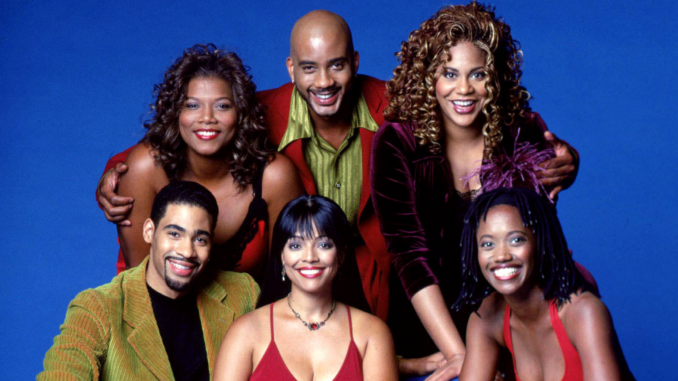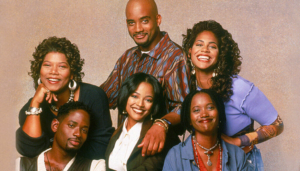
What If … Iconic ‘Living Single’ Show Title and Theme Song Remained in Their Original Versions?
Living Single was one of the most beloved sitcoms of the 1990s, offering a fun, unique look at the lives of six young adults living in Brooklyn, New York. This show not only entertained but also sparked cultural conversations with its groundbreaking portrayal of Black life, friendship, and the challenges of adulthood. However, it almost had a very different identity — from its title to its theme song. But what if Living Single had kept its original title and theme song? How would that have changed the legacy of the show? Let’s dive into an alternate universe and explore the possibilities!
The Original Title: Single Living vs. Living Single
Did you know that Living Single almost wasn’t called Living Single at all? Initially, the show was titled Single Living, but it was eventually changed to the more empowering Living Single. So, what’s the real difference?
Why the Title Change Mattered
The title change from Single Living to Living Single was not just a minor tweak — it was a shift in how the show was perceived. Single Living felt a bit more transactional, implying that living as a single person was the focus, but Living Single gave a sense of confidence, empowerment, and independence. The new title celebrated the characters as whole, dynamic people who just happened to be single rather than focusing on their relationship status.
- Empowerment Over Status: The title Living Single immediately positions the characters as confident individuals, not defined by their romantic relationships.
- Relatability: It made the show more relatable to a wider audience, as people could see themselves reflected in the characters, regardless of whether they were single or not.
Would Single Living have had the same punch? Probably not. It might have made the show seem like a generic “single people living their lives” sitcom. But Living Single made it clear from the start: this wasn’t your average show. This was a celebration of friendship, independence, and the ups and downs of adult life.
A Shift in Audience Appeal
Imagine if the title had stayed as Single Living — the focus may have shifted away from the true essence of the show. It could have made the audience feel as though the characters were only defined by their relationship status, possibly limiting its cultural impact. By changing to Living Single, the show transcended romantic relationships and focused on the power of friendship, career growth, and personal development.
The Iconic Theme Song: What If It Stayed as It Was?
If you hear the words “Living Single,” what’s the first thing that pops into your head? It’s probably Queen Latifah’s iconic theme song! The upbeat and catchy theme song was more than just a musical intro; it was a key component of the show’s identity.
Original Version of the Theme Song: A Missed Opportunity?
The original version of the theme song for Living Single wasn’t quite the anthem we all know and love. Before Queen Latifah performed the final version, there was a different rendition that didn’t quite capture the same energy. Imagine if that original version had made it to air!
- Energetic Vibes: Queen Latifah’s final theme song brought an undeniable energy and joy to the show. Her presence alone added credibility and star power.
- Catchy and Iconic: The song became almost as iconic as the show itself, with its catchy beat and empowering lyrics. It wasn’t just a theme song — it was a cultural moment.
Had the original, lesser-known version stayed, would it have resonated with viewers the same way? Likely not. Queen Latifah’s contribution to the theme song was a game-changer. Her voice brought authenticity and energy to the show’s vibe, and that sense of empowerment has stuck with audiences even years after the show went off the air.

Cultural Impact: A Song That Defined an Era
Queen Latifah’s theme song for Living Single wasn’t just catchy. It became a cultural marker for Black women, independence, and the ’90s era. If it had been a less dynamic version, it might not have become the anthem it is today.
The theme song became synonymous with the empowering narrative of the show, which explored the lives of six diverse and complex women, each of whom broke the mold of typical TV sitcom characters. Living Single stood apart by showcasing Black women as successful, independent, and full of personality.
What Could Have Happened if Things Stayed the Same?
If the title and theme song had remained in their original versions, Living Single would likely have still been a beloved show, but would it have become the cultural touchstone it is today?
Losing the Power of Identity
The final title Living Single gave the show an identity that screamed confidence. If the title remained as Single Living, the show’s characters might have come across as more passive, waiting for life to happen to them rather than actively living their lives. The title Living Single exuded self-sufficiency and a bold approach to life — a message that resonated deeply with audiences, especially in the ’90s.
A Missed Opportunity for Cultural Relevance
The final theme song, with its upbeat, celebratory vibe, paired perfectly with the show’s empowering messages. If the theme had stayed as a less energetic, generic tune, it might not have captured the attention of viewers in the same way. The song itself became a reflection of the show’s essence — it wasn’t just background music; it was a soundtrack for a generation.
How the Show Would Have Felt Without These Changes
Without these critical changes, Living Single could have been just another sitcom. Its relatability might have been reduced, its cultural relevance might have been diminished, and its legacy as a trailblazer in African American representation on television could have been diluted.
Audience Connection
The connection viewers had with Living Single was about more than just the plotlines — it was about the shared experience of young adulthood, the pursuit of career goals, and navigating friendship. The empowering title and theme song helped to reinforce that connection.
Would the Show Have Been As Successful?
The success of Living Single cannot be solely attributed to its title and theme song, but those elements certainly played a pivotal role. By changing the title to Living Single, the show sent a message of empowerment to its audience. Queen Latifah’s theme song became a rallying cry for a generation.
In this alternate reality where the title and theme song stayed the same, the show might still have resonated with its audience, but it’s unlikely it would have achieved the same iconic status. These elements were instrumental in giving Living Single a distinct identity and a cultural relevance that continues to impact audiences today.
Conclusion: The Power of Identity and Representation in ‘Living Single’
What if Living Single had kept its original title and theme song? While the show would have still been beloved, it might not have reached the level of cultural impact that it did. The title change from Single Living to Living Single helped to frame the show as one of empowerment and independence. Meanwhile, Queen Latifah’s iconic theme song became an anthem for the show, adding an extra layer of energy and resonance. These elements played a crucial role in defining the show’s legacy and ensuring that Living Single would remain a staple of 90s television for years to come.
FAQs
1. Why was Living Single originally called Single Living?
The original title, Single Living, was changed to Living Single for a more empowering message that celebrated the characters’ independence and confidence.
2. Who performed the iconic Living Single theme song?
The theme song was performed by Queen Latifah, whose voice and presence added significant energy to the show.
3. How did the theme song impact the show’s success?
The theme song helped define the show’s energy and resonated with viewers, making it an iconic anthem for independence and empowerment.
4. Would the show have been as successful if the title and theme song remained unchanged?
While Living Single would still have been popular, the empowering title and energetic theme song were crucial in shaping the show’s identity and cultural impact.
5. Why is Living Single considered a cultural touchstone?
Living Single is considered a cultural touchstone because it offered a fresh perspective on African American life and relationships, with a focus on strong friendships and personal empowerment.
